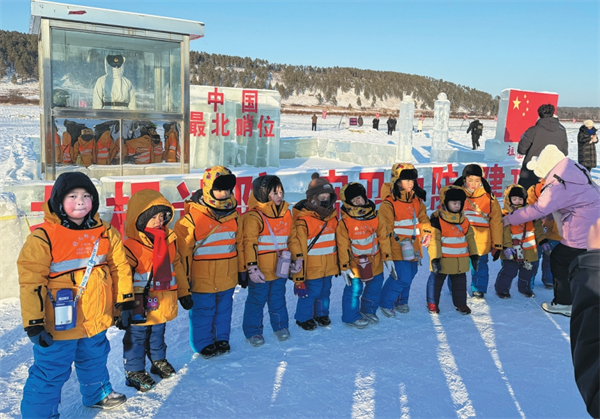Home>Harbin Today
China-Russia oil pipeline delivers 124.07 million tons
Updated : 2018-01-24
By Yang Min ( chinadaily.com.cn )
The China-Russia oil pipeline transported 16.5 million tons of crude oil valued at 6.68 billion yuan ($1.04 billion) in 2017; and the total amount of crude oil transported has reached 124.07 million tons since it began operations in 2011, according to statistics from Heilongjiang Entry-Exit Inspection and Quarantine Bureau.
The pipeline delivers oil from Russia's Far East to China through its northeastern provinces.
The 1,000-kilometer line originates in the Russian town of Skovorodino in the Amur region, enters China at Xingan, and terminates at Daqing city in Heilongjiang province. The section of the oil pipeline that runs through China is around 927.04 km, and the Russian section measures 72 km.
The designed annual transportation capacity of the oil pipeline is 15 million tons, and the maximum transportation capacity can reach 30 million tons. It opened on January 1, 2011.
The extended section of the China-Russia oil pipeline, which links Mohe and Linyuan county of Daqing city in Northeast China’s Heilongjiang province, officially commenced commercial operations on Jan 1, 2018. It marks an increase in annual crude oil imports from Russia –– from 15 million tons to 30 million tons in 2018.
The pipeline has reduced costs and raised the efficiency of importing oil from Russia, which had previously relied on rail. It will also play an important role in protecting the security of China’s oil supplies.
China consumed about 560 million tons of crude oil in 2016, 65 percent of which was imported, and both oil consumption and the proportion imported will continue to rise, according to China National Petroleum Corporation, China's largest oil producer and supplier.
The China-Russia oil pipeline has become a vital part of China’s energy infrastructure.
To guarantee the quality of crude oil imported from Russia, the Heilongjiang Entry-Exit Inspection and Quarantine Bureau invested around 4 million yuan in establishing a national-level key laboratory to test its quality, which mainly tests for 13 indicators of crude oil, such as density, moisture, mechanical impurities and the chlorine salt content.
Meanwhile, the Heilongjiang bureau has sped up research of crude oil detection and participated in setting national standards for crude oil, resulting in the revision of Russia’s standards for testing moisture in crude oil –– standards that have existed for 50 years.

A photograph of an oil depot for crude oil imported from Russia through the China-Russia oil pipeline.[Photo/Chinanews.com]

A photograph of an oil depot for crude oil imported from Russia through the China-Russia oil pipeline.[Photo/Chinanews.com]

Staff members from Heilongjiang Entry-Exit Inspection and Quarantine Bureau test crude oil imported from Russia.[Photo/Chinanews.com]

Harbin ramps up childcare services
A new comprehensive service center for childcare in Harbin is expected to be finished by the end of the year.
-
Talent policies drive enterprise development in Harbin
Harbin's "30 New Talent Policies" represents an iterative upgrade to the talent policy system, helping attract and retain talent to bolster economic and social development.
-
Official website of 2025 Asian Winter Games goes live
Harbin, the host city of the 9th Asian Winter Games, has announced that the official website for the 2025 event has recently gone live.
-
Harbin launches measures to facilitate more foreign trade
In the first three quarters of 2023, the total import and export value of Heilongjiang province's goods trade hit 218.22 billion yuan.





